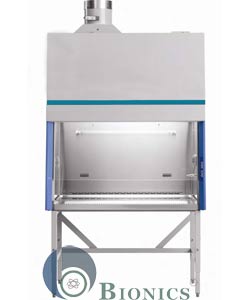The Growing Craze About the Class 2 Biosafety Cabinets
The Growing Craze About the Class 2 Biosafety Cabinets
Blog Article
Class 2 Biosafety Cabinets: Essential Equipment for Laboratory Safety and Microbiological Containment

Maintaining a safe lab environment is crucial in today’s advanced research and clinical setups. Whether it's handling live pathogens or sensitive diagnostics, biosafety cabinets form the backbone of contamination control.
Among the available options, Class 2 Biosafety Cabinets stand out for their balanced protection. These units are indispensable tools for pathogen handling and biological research.
Understanding Biosafety Cabinets
Biosafety cabinets are ventilated enclosures built to protect both users and biological materials. They use HEPA filtration to remove contaminants from incoming and outgoing air.
These units are generally classified into three main types: Class I, II, and III based on containment level. Among these, Class 2 cabinets are the most versatile and commonly used.
Defining Class 2 Biosafety Cabinets and Their Role
Class 2 Biosafety Cabinets are designed to safeguard three aspects: the operator, the sample, and the environment. They utilise downward laminar airflow within a sealed system.
Both incoming and outgoing air are HEPA-filtered to maintain sterility and prevent leaks. These cabinets are frequently used in labs handling infectious agents or clinical samples.
Essential Features of Class 2 Safety Cabinets
A Class 2 microbiological safety cabinet includes several critical technologies such as:
• HEPA/ULPA filtration to trap microbes and particles
• Laminar airflow that minimises disruption and contamination
• Pressure differentials that maintain internal containment
• Optional UV lights for overnight sterilisation
• Low sound emissions to reduce fatigue
• Clear front panel for visibility and safety
These elements ensure safety, comfort, and efficiency in day-to-day lab tasks.
Industries and Labs That Rely on Microbiological Safety Cabinets
Class 2 Biosafety Cabinets are commonly used across microbiology, biotechnology, diagnostics, and pharma. They are ideal for safe handling of samples during testing and experimentation.
Whether in hospitals or drug manufacturing, these units are essential for clean procedures.
Why Laboratories Prefer Class II Safety Cabinets
Using Class 2 cabinets offers multiple advantages including operator protection and experimental reliability:
• Protects the integrity of lab work
• Acts as a barrier between user and biohazard
• Ensures filtered air is safe for release or recirculation
These cabinets help labs meet safety regulations while maintaining workflow.
Regulatory Standards for Class 2 Cabinets
Top manufacturers ensure their cabinets meet certifications like NSF 49, EN 12469, and WHO recommendations. Class 2 units are sub-classified as A1, A2, B1, and B2—each with distinct airflow and exhaust features.
• Type A2: Ideal for general-purpose labs
• Type B2: Exhausts 100% of air via ducting; no recirculation
Matching the cabinet type to your process is essential.
Tips for Purchasing the Ideal Biosafety Cabinet
Before purchasing, consider:
• Your application type (e.g., diagnostics, pharma, research)
• Cabinet dimensions, ducting needs, Biosafety Cabinets and room layout
• Energy consumption and maintenance frequency
• Warranty, training, and certification services
Consulting with experts ensures the cabinet fits both budget and compliance goals.
Installation and Safety Guidelines
For optimal results:
• Avoid placing near doors, vents, or fans
• Schedule regular performance checks
• Ensure operators follow best practices
Operational best practices include:
• Maintain biosafety gear protocols
• Minimise hand movements inside the cabinet
• Clean all contact points post-operation
• Treat UV usage as an overnight sterilisation method
Why Class 2 Cabinets Are a Must-Have in Labs
Class 2 biosafety cabinets are essential for labs that value safety, precision, and cleanliness. They safeguard both research outcomes and operator health.
From clinical research to vaccine development, Class II cabinets support world-class laboratory practices. When investing in a biosafety cabinet, opt for trusted brands that offer end-to-end service—because safe science starts with smart containment. Report this page